A request that this article title be changed to 2024 Iranian airstrikes against Israel is under discussion . Please do not move this article until the discussion is closed. |
2024 Iranian strikes against Israel may refer to:
A request that this article title be changed to 2024 Iranian airstrikes against Israel is under discussion . Please do not move this article until the discussion is closed. |
2024 Iranian strikes against Israel may refer to:
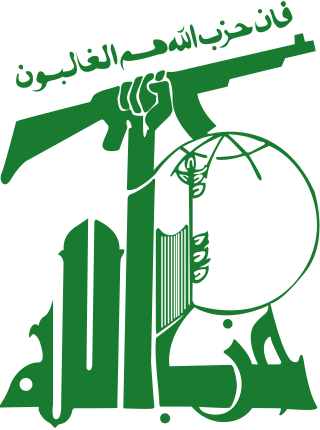
Hezbollah is a Lebanese Shia Islamist political party and militant group. Its paramilitary wing is the Jihad Council. Hezbollah was led by Secretary-General Hassan Nasrallah from 1992 until his assassination in an airstrike in Beirut in September 2024.
2024 (MMXXIV) is the current year, and is a leap year starting on Monday of the Gregorian calendar, the 2024th year of the Common Era (CE) and Anno Domini (AD) designations, the 24th year of the 3rd millennium and the 21st century, and the 5th year of the 2020s decade.
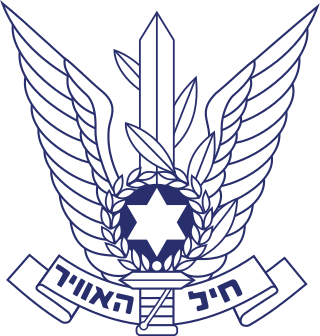
The Israeli Air Force operates as the aerial and space warfare branch of the Israel Defense Forces (IDF). It was founded on May 28, 1948, shortly after the Israeli Declaration of Independence. As of April 2022, Aluf Tomer Bar has been serving as the Air Force commander.

Hassan Nasrallah was a Lebanese cleric and politician who served as the secretary-general of Hezbollah, a Shia Islamist political party and militia, from 1992 until his assassination in September 2024.

Al-Quds Brigades is a paramilitary organisation and the armed wing of the Palestinian Islamist organization Palestinian Islamic Jihad (PIJ), which is the second largest armed group in the Gaza Strip, after Hamas. AQB's leader is Ziyad al-Nakhalah, based in Damascus, Syria. The head of AQB in the Gaza Strip was Baha Abu al-Ata until he was killed in November 2019.

The relations between Iran and Israel are divided into four major phases: the ambivalent period from 1947 to 1953, the friendly period during the era of the Pahlavi dynasty from 1953 to 1979, the worsening period following the Iranian Revolution from 1979 to 1990, and the ongoing period of open hostility since the end of the Gulf War in 1991. In 1947, Iran was among 13 countries that voted against the United Nations Partition Plan for the British Mandate of Palestine. Two years later, Iran also voted against Israel's admission to the United Nations.
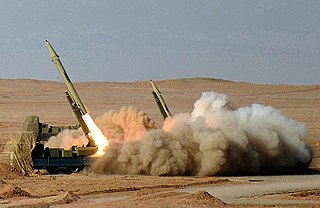
The Fateh-110, also known as NP-110 is an Iranian solid-fueled surface-to-surface ballistic missile produced by Iran's Aerospace Industries Organization since 2002. It is single-stage, road-mobile and can carry a high-explosive warhead of up to 500 kg. Four different versions, the Fateh-110A, 110B, 110D-1 and Fateh-E Mobin were developed with varying accuracy. The latest version, first shown to the public in August 2018 reportedly has a range of 300 km is reportedly more accurate than previous versions.
Military action against Iran is a controversial topic in Israel and the United States. Proponents of a strike against Iran point to the threat presented by Iran's nuclear program as a casus belli. Many Israelis, and particularly hardline politicians such as Prime Minister Benjamin Netanyahu, American neoconservatives, Iranian dissidents support military action to stop the program or go further to overthrow the regime. Opposition to military action is often based in pacifism, but some who are opposed to military action against Iran are opposed for other reasons.

Since the Iranian Revolution in 1979, the Islamic Republic of Iran has been embroiled in tense relations with the U.S. and its allies. Following the hostage crisis, both countries severed relations. Since then, both countries have been involved in numerous direct confrontations, diplomatic incidents, and proxy wars throughout the Middle East, which has caused the tense nature of the relationship between the two to be called an 'international crisis'. Both countries have often accused each other of breaking international law on several occasions. The U.S. has often accused Iran of sponsoring terrorism and of illegally maintaining a nuclear program, as well as using strong rhetoric against Israel, of which Iran has questioned its legitimacy and its right to exist while supporting Hamas, an antizionist terrorist group in the Gaza Strip. Meanwhile, Iran has often accused the U.S. of human rights violations and of meddling in their affairs, especially within the Iranian Democracy Movement.
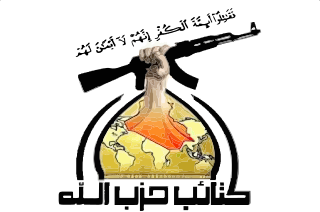
Kata'ib Hezbollah, also known as the Hezbollah Brigades, is a radical Iraqi Shiite paramilitary group which is a part of the Iraqi Popular Mobilization Forces (PMF), staffing the 45th, 46th, and 47th Brigades. During the Iraq War (2003–11), the group fought against Coalition forces. It has been active in the War in Iraq (2013–2017) and the Syrian Civil War. The group was commanded by Abu Mahdi al-Muhandis until he was killed in a US drone attack in 2020. Thereafter, Abdul Aziz al-Muhammadawi became the new leader of the PMF. The group seeks to establish an Iran-aligned government in Iraq, expel American forces from the country, and advance the regional and international interests of Iran in Iraq and the region. The group is responsible for killing hundreds of U.S. soldiers and takes a central part in carrying out attacks against U.S. targets in Iraq and acts as part of the Axis of Resistance. Kata'ib Hezbollah has received extensive training, funding, logistic support, weapons, and intelligence from the IRGC's elite Quds Force.
The Axis of Resistance is a network of Iranian-backed militias and political groups in the Middle East, formed by Iran by uniting and grooming armed groups that shared hostility toward Israel and the United States. The U.S. designates most of these groups as terrorist organizations.

The Iran–Israel proxy conflict, also known as the Iran–Israel proxy war or Iran–Israel Cold War, is an ongoing proxy conflict between Iran and Israel. In the Israeli–Lebanese conflict, Iran has supported Lebanese Shia militias, most notably Hezbollah. In the Israeli–Palestinian conflict, Iran has backed Palestinian groups such as Hamas. Israel has supported Iranian rebels, such as the People's Mujahedin of Iran, conducted airstrikes against Iranian allies in Syria and assassinated Iranian nuclear scientists. In 2018 Israeli forces directly attacked Iranian forces in Syria.
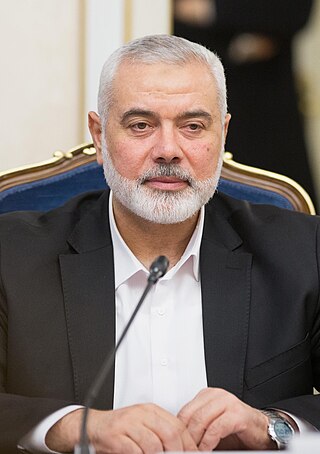
Ismail Haniyeh was a Palestinian politician who served as chairman of the Hamas Political Bureau from May 2017 until his assassination in July 2024. He also served as prime minister of the Palestinian National Authority from March 2006 until June 2014 and Hamas leader in the Gaza Strip from June 2007 until February 2017, where he was succeeded by Yahya Sinwar.
The January 2015 Mazraat Amal incident was an airstrike against a two-car convoy that killed six Hezbollah fighters, including two prominent commanders, and a general of the Iranian Revolutionary Guards (IRGC), Mohammad Ali Allahdadi, at al-Amal Farms in the Quneitra District of Syria, in the Eastern Golan Heights, on 18 January 2015, during the Syrian Civil War. The attack was largely attributed to Israel, which did not officially confirm that it carried it out. Hezbollah and IRGC held Israel responsible and threatened to retaliate. On 19 January 2015, Al-Nusra Front member Abu Azzam al-Idlibi claimed that Jihad Mughniyeh and the other Hezbollah fighters were killed in an Al-Nusra Front ambush at Jaroud in the Qalamoun Mountains in the Al-Qutayfah District northeast of Damascus, claiming that it "will be the end of the Persian project, God willing."

The Sistan and Baluchestan insurgency is an ongoing low-intensity asymmetric conflict in Sistan and Baluchestan Province between Iran and several Baloch Sunni militant organizations designated as terrorist organizations by the Iranian government. It began in 2004 and is part of the wider Balochistan conflict.
The May 2018 Israel–Iran clashes were a series of short military confrontations between Israeli and Iranian forces in Syria. On 10 May 2018 the Israeli military stated that Iranian forces in Syria launched 20 rockets against Israeli army positions on Western Golan Heights. The Syrian Observatory for Human Rights said that the attack occurred after Baath, a town in the demilitarised zone, was bombarded by Israeli forces. According to the Israel Defense Forces (IDF) some missiles were intercepted by Israel's Iron Dome system, while some fell short in Syrian territory.
The Iran–Israel conflict during the Syrian civil war refers to the Iranian–Israeli standoff in and around Syria during the Syrian conflict. With increasing Iranian involvement in Syria from 2011 onwards, the conflict shifted from a proxy war into a direct confrontation by early 2018.
A series of airstrikes were carried out by the Israeli Air Force on multiple Iranian-linked targets in the Deir ez-Zor Governorate of Syria on 13 January 2021. 57 people were killed according to Israeli reports. Iranian sources confirmed the strikes, but said that only Syrian Army positions were hit. Israel carried out another airstrike in Hama nine days later, killing a family of four, including two children, according to Syrian state media.